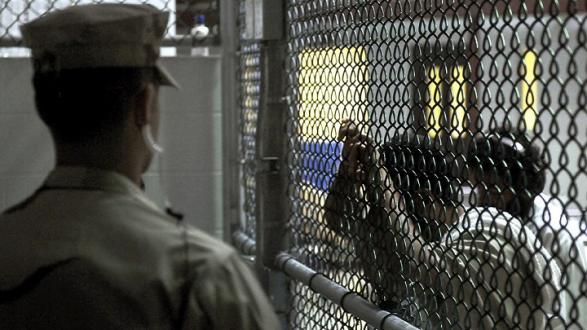On February 21, 2015, I made my second trip to Guantánamo Bay, Cuba, to serve as an official NGO hearing observer on behalf of the Pacific Council. In the case I traveled to witness, the United States alleges that Abd al-Rahim al-Nashiri masterminded the October 12, 2000, bombing of the USS Cole. In February 2014, I had observed pretrial proceedings in the case against Mr. Nashiri at Guantánamo (GTMO).
The principal issue before the court during my most recent visit concerned the propriety of Change One, which required all military commission judges to move to GTMO to hear cases assigned to them. The practical effect of implementing Change One would mandate Air Force Col. Vance Spath, the trial judge in the Nashiri matter, to relinquish all cases assigned to his docket in other locations and move full-time to GTMO to focus solely on the Nashiri case. Nashiri’s defense team filed two motions against the adoption of Change One, arguing that: (1) it would result in an appearance of undue command influence; and (2) it would enforce actual undue command influence.
While we observed Mr. Nashiri’s hearing, we also learned that the judge in the 9-11 trials, Col. James L. Pohl, had found similar defense motions to be persuasive and concluded that the adoption of Change One created the appearance of undue command influence. Judge Pohl abated the 9-11 proceedings until Change One was rescinded. After my return to the mainland, I learned that Judge Spath similarly ruled in the Nashiri matter that Change One created the appearance of undue command influence, but declined to dismiss the charges against Mr. Nashiri. Judge Spath has since stayed the Nashiri proceedings until the resolution of two pending government appeals, and granted the defense’s motion for an MRI scan to detect what damage, if any, resulted from torture inflicted on Mr. Nashiri in secret CIA prisons.
I am a firm believer in the Constitutional power of Article III courts to deliberately and finally resolve the charges against and status of the remaining GTMO detainees.
This further delay in the proceedings calls into question the quality of justice afforded to defendants in GTMO prosecutions. The proceedings’ glacial pace undermines the legitimacy of the Commissions themselves.
Indeed, my recent trip to GTMO confirmed my belief that the remaining detainees should be tried in Article III federal district courts. National political and legal debates have raged for years about whether detainees should be tried in military tribunals versus Article III courts and where and whether certain persons should be detained. Meanwhile, the proceedings stumble from one legal roadblock or hurdle to another. I am a firm believer in the Constitutional power of Article III courts to deliberately and finally resolve the charges against and status of the remaining GTMO detainees.
Opponents of trying GTMO detainees in Article III courts raise legitimate concerns about the adequacy of security and the fact that the proceedings would have to restart. Yet a number of Article III courts have demonstrated over the last decade that they are capable of trying alleged terrorists expeditiously and in a manner consistent with the highest standards of justice and equity.
As Morris D. Davis – a retired Air Force colonel who was the chief prosecutor of the military commissions at Guantánamo Bay from September 2005 until October 2007 – recently opined in the New York Times: “[W]e have a legal system where it is more advantageous to be found guilty of a war crime than never to be charged at all and remain imprisoned indefinitely.”
Allowing for the transfer of jurisdiction for all detainees to Article III courts would also allow many uncharged detainees languishing at GTMO to have their cases resolved. For instance, Obaidullah, a detainee whom my firm represents, is one of the individuals who continues to be held without charges pending against him and with no adjudication in sight. As Morris D. Davis – a retired Air Force colonel who was the chief prosecutor of the military commissions at Guantánamo Bay from September 2005 until October 2007 – recently opined in the New York Times: “[W]e have a legal system where it is more advantageous to be found guilty of a war crime than never to be charged at all and remain imprisoned indefinitely.”
The indefinite detention of scores of detainees without charges or opportunity for trial, exacerbated by the slow progress of the proceedings, is unacceptable under our Nation’s commitment to the rule of law. For these reasons, I believe that moving these proceedings from the military commissions to Article III courts is the wiser, morally principled, and just course to be taken.
____________________
Marisa Hernández-Stern is an associate at the civil rights firm Hadsell Stormer & Renick and a member of the Pacific Council. In 2011, Ms. Hernandez-Stern’s brother, Benjamin Hernández-Stern, forward deployed to Iraq with the Criminal Investigation Task Force, the investigative arm of the Office of Military Commissions. This dispatch reflects only the personal views of the author.
The views and opinions expressed here are those of the author and do not necessarily reflect the official policy or position of the Pacific Council.




